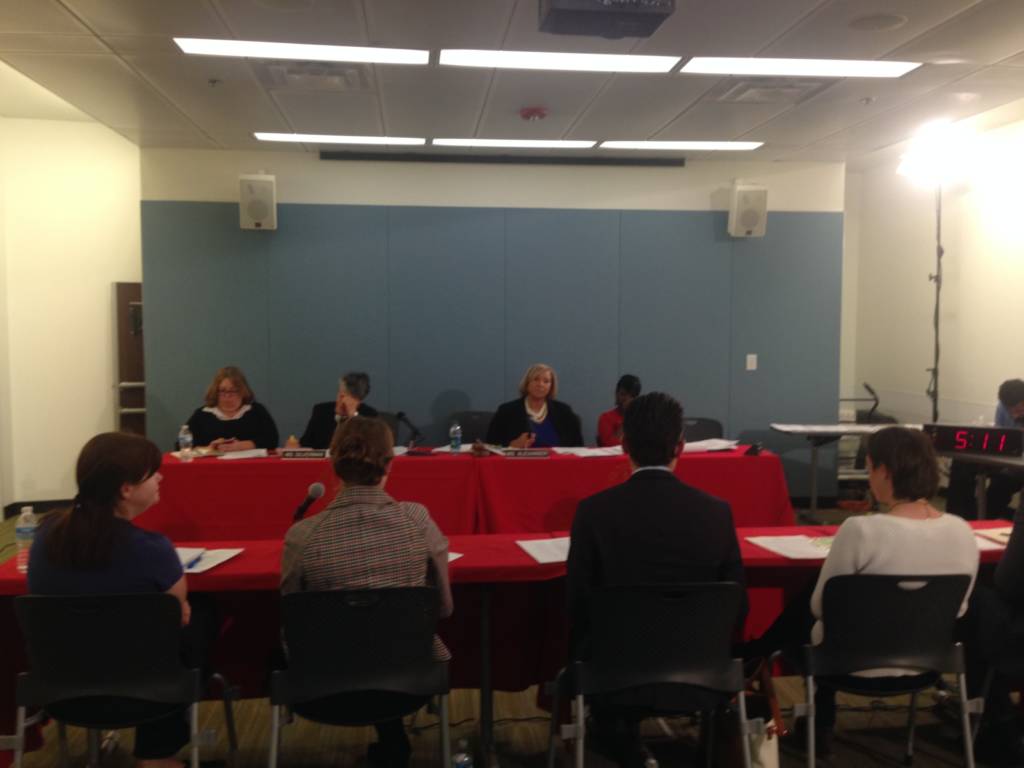More than 60,000 families face losing financial assistance from the Temporary Assistance for Needy Families program (TANF). The welfare program’s benefits expire after 60 months: October 1, 2016 for the families in question.
Councilmember Yvette Alexander, Chairperson of the Committee on Health and Human Services, hosted a public oversight roundtable on November 17 to hear from families on TANF. Councilmember Elissa Silverman, also attended the meeting.
Kate Coventry, a policy analyst with the DC Fiscal Policy Institute, argued that the barriers that each family faces needs to be assessed on a case-by-case basis.
“D.C.’s time limit fails to recognize the complex lives of many poor families,” Coventry said. “Forty-four states recognize that some families need more time after they reach 60 months to move to self-sufficiency. But D.C.’s rigid time limit has no exceptions.”
Families have not been receiving adequate services for years, according to Coventry, who questions the fairness of including those years in the 60-month time limit.
A group of mothers who are currently on TANF, or were at some point, offered their insight on job preparation, placement, retention services, and supports provided by the program.
“We need to put a face on TANF because I can tell that there are probably a lot of misconceptions out there of who actually is receiving these benefits,” Alexander said. “So we do need to hear your stories and we do need to see faces.”
TANF is a District financial aid program that provides assistance to families with dependent children. In order to receive these benefits, adults must be D.C. residents and must participate in work activities.
Alexis Young, the single mother of a 3-year-old, testified at the roundtable. She is a current recipient of TANF and has been on and off it for 2 years. Young also has a blood disorder that makes her very dependent on the assistance.
“TANF has been the top source of my sanity, alone,” Young said as she broke down in tears. “$300 is not a lot of money, but it stabilizes me and my baby girl.”
Two of the biggest issues that these mothers had with TANF were poor case management and bad job placement programs.
A majority of the women who testified claimed that they were not receiving the one-on-one care they expected from their case managers. Many felt ignored and even snubbed during these interactions.
Maya Perkins’ experience with TANF was far from good. She said that her caseworker provided by the MAXIMUS Corporation made no eye contact and was rude to her.
Alexis Young said she felt like a number, not a person, and that she was ignored by her caseworker. She changed caseworkers so often that retelling her story to every new person became very upsetting.
Sabrina Lancaster, a former TANF recipient, was cut off because the program considered her husband’s $8.35 per hour wage as too much household income to receive benefits. He was supporting their four children and her. She was also attending college full-time when this happened.
“Since being off TANF, it has been very difficult for me and my husband to meet our families basic needs,” Lancaster said. “We struggle with rent on a monthly basis, which wasn’t a huge problem when we received TANF.”
Lancaster also commented on the work placement program, which in her opinion doesn’t place people in jobs where their skillset is useful or valued.
“I didn’t want to be offered a position that doesn’t match my skillset. This is what most TANF vendors are guilty of,” she said. “Even if an assessment is filled out showing what my skills are, what strengths I have and what my interests are, there are still employees trying their best to place me in fast food entry-level positions.”
As a currently unemployed mother with a college degree and a little boy, Andrea Swanson is very frustrated with TANF and her unemployment.
Swanson used to be a schoolteacher and lived comfortably. That all changed when her school lost their charter and she lost her job. Swanson went on to lose her home and car. She lived in a shelter for some time.
Swanson knows she is qualified and wants a job. But she can’t get one and doesn’t think the job placement program at TANF is helping enough.
“So you’re saying ‘go to college, get your education, you’re going to be able to get a good job,’ and I did that, so now what?” Swanson said.
Not every person who testified related a bad experience. Chiquita Foster said that she had a great experience with her caseworker, who was at the roundtable accompanying her.
Foster said that she heard about other people having bad experiences with their casework vendors, but she has personally seen the opposite..
“I can relate to them but at the same time I really don’t know,” Foster said.
Myesha Inman, who will receive her college degree in 2017, said that she too had a great experience with her vendor, Grant Associates. The caseworkers were there for her when she lost her son.
Councilmember Silverman took over and began asking questions to the mothers testifying.
“Let me ask a general question: Does anyone not want to work? Is staying on TANF a livable salary for people,” she said. There was an overwhelming exclamation of “no!” and head-shaking from the mothers.
“What I am hearing from the five people sitting in front of me is that you don’t want just a job, you want a career,” Silverman said.
“Sometimes, because we need to show results, there is an incentive to get people into any job – which might not be a sustainable job. And they you cycle back on to TANF,” Silverman said.
“The wages are so low, that you have to make a rational decision as a mom: does it make sense for me to go back to work, given the cost of childcare? Is it worth it for me to go back to work?” she added. “We have to make it worthwhile so that the answer is yes every time.”
Councilmember Alexander thanked the TANF recipients for their testimonies:
“The face of all of us could be in the same situation. And I think sometimes stereotypes get out there and you are put into a bubble,” she said. “…we need to hear this directly from you. I appreciate the advocates, and I appreciate [The Department of Human Services], but you are the voice.”








